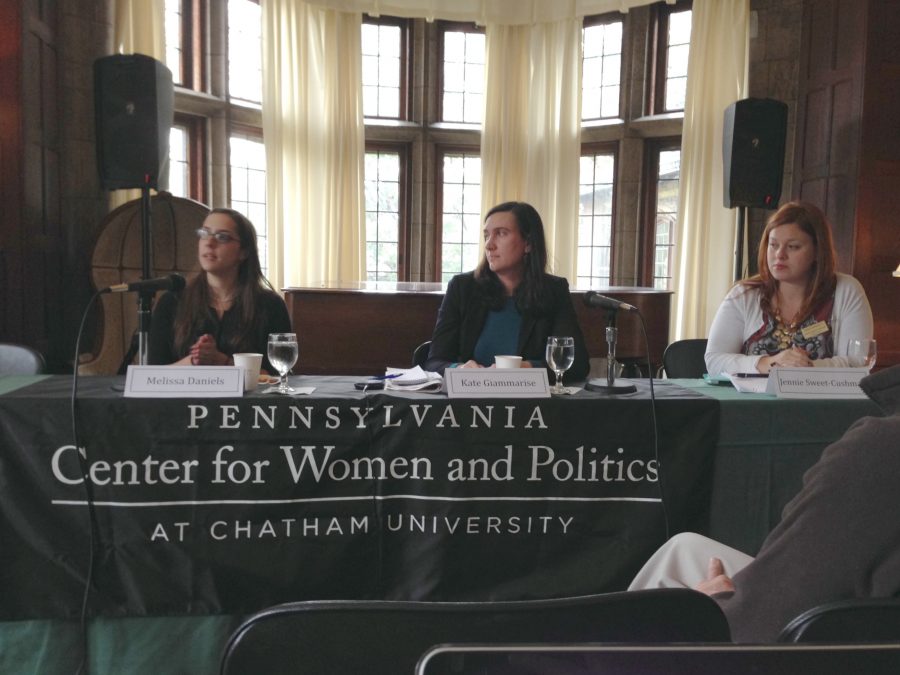As per usual, the first Tuesday of November marked Election Day, when inclined citizens decide who they would like to hold local, state, and national offices. Since casting a vote does not equate to understanding the process or results, the Pennsylvania Center for Women and Politics (PCWP) hosted “The Day After: Post-Election Analysis” in the Mellon Living Room, featuring a panel of political experts to break down the events of the previous day and to speculate about their effects on the future of Pennsylvania and US politics.
Dana Brown, Executive Director of the PCWP and an Assistant Professor of Political Science at Chatham, began the afternoon with introductions.
After joking that the room of about 30 attendees held all of Pennsylvania’s voters, Brown stated that the goal of the panel discussion was to figure out, “what the heck happened last night.”
Brown introduced the event’s panelists, which included Melissa Daniels, a writer for the Pittsburgh Tribune-Review who specializes in state and local government coverage; Kate Giammarise, a writer for the Pittsburgh Post-Gazette who covers Pennsylvania state government; and Dr. Jennie Sweet-Cushman, the Assistant Director of the PCWP and an Assistant Professor of Political Science at Chatham.
“The Commonwealth made history last night,” said Brown. “Depending on which side you’re on, you’re excited about it or you’re sad about it.”
Brown was referring to the victory of Democrat Tom Wolf over Republican incumbent Tom Corbett in the race for Governor. This is the first time in Pennsylvania history in which an incumbent candidate has been defeated.
In a brief overview of the election results, Brown stated that the Republican Party “won big” in the Pennsylvania state legislature. Republicans won five out of five competitive State Senate races. Republicans also added eight seats to their majority in the State House of Representatives, which will mean a 119 to 84 split between Republicans and Democrats.
According to Brown, there was a “big Republican wave” nationally, as well. Senator Mitch McConnell of Kentucky, who has been the Senate’s Minority Leader since 2007, will be its new Majority Leader come January. In addition, the US House of Representatives will be divided 243 to 176 between Republicans and Democrats.
Brown’s first question for the panel was about Democrat Wolf’s victory over Republican incumbent Corbett during an election in which Republicans made gains in nearly all other areas—a result that seemed to have gone, “against all of the trends,” according to Brown.
The panelists agreed that Corbett had essentially lost the election before the campaign began. He has had low favorability since he took office in 2010, and Wolf gained the “ABC” vote, or the “Anyone But Corbett” vote.
When Brown asked what Corbett could have done differently, the panelists agreed again that the issue that hurt him the most was his decision to cut funding from education.
According to Giammarise, Corbett did not communicate well from the beginning of his campaign about why he made cuts. Governor Chris Christie of New Jersey has also had to make drastic cuts; however, according to Giammarise, he has given explanations for his controversial decisions.
By the time Corbett began communicating his motives for the defunding, “it was too little too late,” according to Daniels.
“We know education is a really important issue, particularly for women,” said Sweet-Cushman. According to her, women broke for Wolf in, “every category you could come up with,” with the exception of white married women.
Giammarise pointed out Pennsylvania was not an anomaly in every aspect of the election; Republicans made gains in every other race. Wolf just served as an alternative to the unpopular Governor Corbett.
Further topics discussed ranged from the gridlock that Wolf is expected to face as a Democratic Governor with a Republican legislature and possible strategies he can take to work across party lines to female candidates in each party and programs that support them (The Anne Anstine Program mentors Pennsylvanian Republican women interested in running for office. Emerge America is a similar program for Democratic women across the country).
To finish up the discussion, Brown asked each of the panelists to share one “take away” from this year’s Election Night.
“For me, it’s the loss of Governor Corbett,” said Daniels. “I think that’s a story that we’ll be remembering and telling for a little bit of time in Pennsylvania political circles.”
Giammarise agreed.
“What happened with Governor Corbett was historic for all of the reasons we’ve discussed,” she said.
Sweet-Cushman shared a broader insight that Democrats should not be too forlorn about what Brown called a “big Republican wave.”
“The media is really, really hyping this Republican ‘landslide,’” she said. “But really when you look at it, there were very few instances of Democrats losing in areas it would be expected for them to win.”
Brown ended the event by encouraging the women in the room to attend Ready to Run, PCWP’s own bipartisan version of the Anstine Series and Emerge America. This “campaign training” seminar will take place on January 31, 2015. For more information, visit https://www.chatham.edu/pcwp/education/readytorun/.
Corrections 11/21/14:
Republicans won five out of five competitive State Senate races.
In addition, the US House of Representatives will be divided 243 to 176 between Republicans and Democrats.


